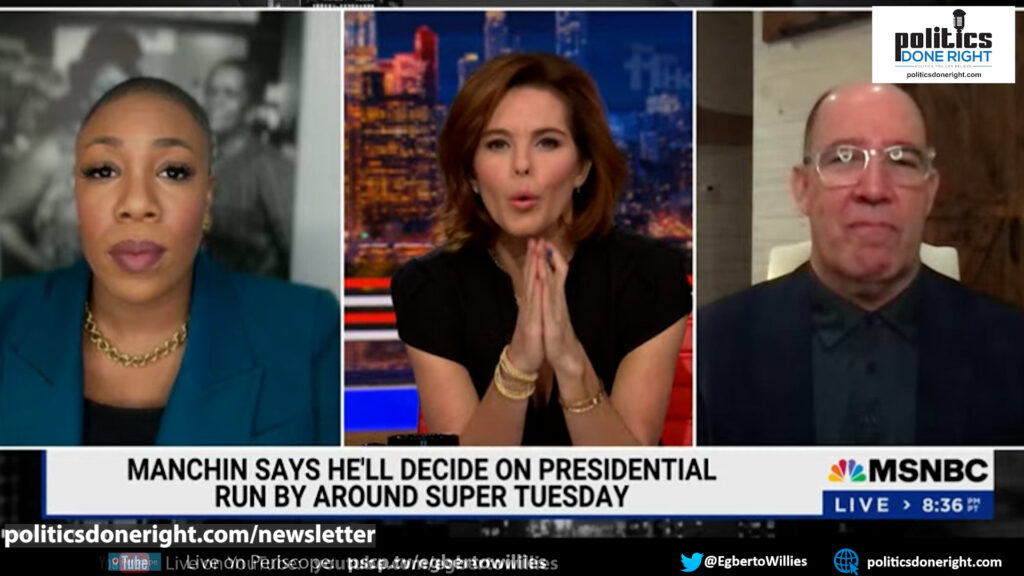Matthew Dowd and Simone Sanders Townsend nail the inconvenient reality that all those who support a Joe Manchin candidacy must accept. He is to the right of where the country is.
Joe Manchin is out of sync with Americans.
The recent discourse about Senator Joe Manchin’s political positioning and potential presidential aspirations, as highlighted in a discussion involving Matthew Dowd and Simone Sanders Townsend, provides a critical lens through which we can examine the current American political landscape. It sheds light on Manchin’s views and underpins broader themes of political centrism, voter demographics, and election strategies in the United States.
Joe Manchin’s Presidential Ambitions and the Democratic Party
Senator Joe Manchin’s openness to running for President of the United States, potentially as a third-party candidate, marks a significant deviation from traditional party politics. His skepticism about President Biden and Vice President Harris leading the Democratic ticket in 2024 signifies a deeper rift within the party. Manchin, a centrist or even conservative Democrat, appears to challenge the current direction of the Democratic Party, which has been gravitating towards more progressive stances on several issues.
The Myth of Centrism: Manchin’s Misalignment with American Views
One of the pivotal critiques raised by both Dowd and Sanders Townsend is the misconception of Manchin’s centrism. Manchin claims to represent the center of the American political spectrum, but this claim is increasingly questionable. Too many Democrats are trying to find the non-existent mythical center.
The Democratic Party, under Biden’s leadership, has adopted positions on key issues like abortion rights, gun control, and economic reforms, which, according to many polls and studies, resonate more accurately with the median American voter’s views. If the center is where Americans are, then it is clear that the true center has a progressive bias.
For instance, Biden’s stance on Roe v. Wade, advocating for its protection, aligns with the majority of Americans who support the right to abortion in most cases. Similarly, his views on gun reform, including universal background checks and assault weapon bans, are in line with public opinion, which has been consistently supportive of more stringent gun control measures. The Biden administration’s focus on raising the minimum wage and taxing the wealthy mirrors a growing public sentiment toward economic equality and justice.
In contrast, Manchin’s opposition to significant climate change legislation, his resistance to more serious gun reform, and his role in preventing the enshrinement of Roe v. Wade into law demonstrate a leaning towards more conservative positions. His support for traditional energy sources like coal further distances him from the progressive agenda or gaining traction among a substantial portion of the electorate.
Joe Manchin and the Young Voter Demographic
The demographic challenge Manchin faces is also significant. The younger electorate, increasingly leaning towards progressive values, does not see Manchin as representing their interests or views. His conservative stances on issues like climate change, gun control, and abortion rights alienate him from this demographic, which is crucial for any presidential candidate. Furthermore, his resistance to abolishing the filibuster, especially in the context of voting rights legislation, positions him unfavorably in the eyes of many voters who prioritize democratic reforms and the protection of voting rights. Abolishing the filibuster would have allowed the Senate to pass legislation that most Americans want.
Manchin, the Right, and Electoral Realities
Manchin’s positioning might inadvertently align him more with right-leaning voters than the center or left. His policy stances, particularly on energy and regulatory matters, resonate more with conservative principles. This alignment raises questions about the feasibility of his potential candidacy, especially in an increasingly polarized political landscape. Manchin’s centrism is more of a liability than an asset in national elections.
Emotional Appeal vs. Rational Argument in Elections
As Dowd points out, elections often hinge on emotional connections rather than logical debates over policy. This perspective suggests that the Biden campaign, and indeed any political campaign, needs to focus on creating an emotional narrative that resonates with voters. Addressing key issues like democracy, freedom, and the nation’s future, rather than just economic arguments, could be pivotal in countering the populist appeal of figures like Donald Trump. That does not negate reminding Americans of the middle-class, poor, and environmental policies effected under Biden’s administration that Republicans will overturn. However, emphasis should be calibrated for maximal results.
Conclusion
Senator Joe Manchin’s political aspirations and positioning within the American political spectrum raise important questions about the direction of the Democratic Party and the broader political landscape in the United States. His claim to centrism is misaligned with the prevailing public opinion on major issues. His challenges in attracting key voter demographics, particularly the young and progressive voters, further complicate his political future. The discussion between Dowd and Sanders Townsend underscores the need for a nuanced understanding of voter sentiment, the importance of emotional appeal in elections, and the evolving nature of political centrism in America.
As the Democratic Party looks towards future elections, it must navigate these complex dynamics, balancing the diverse views within its base while presenting a united front against increasingly polarized opposition. The case of Joe Manchin serves as a microcosm of these broader challenges, highlighting the need for political strategies grounded in rational policy arguments that resonate emotionally with a diverse electorate. The future of American politics may well depend on the ability of the Democratic Party and candidates to understand and address these multifaceted and evolving realities.

